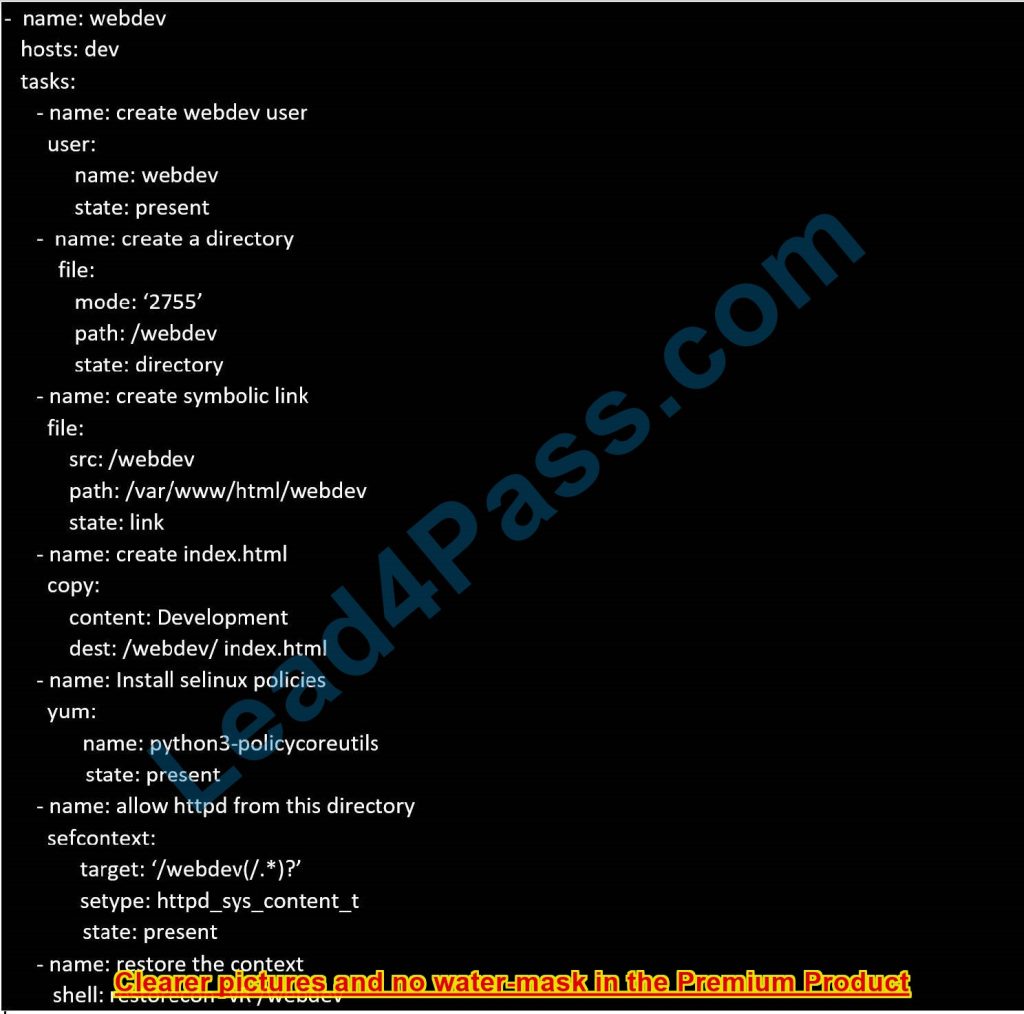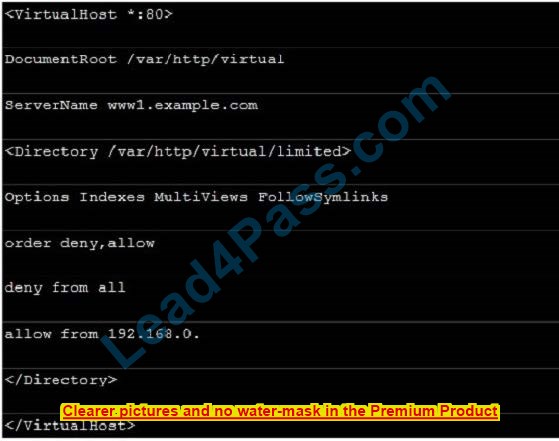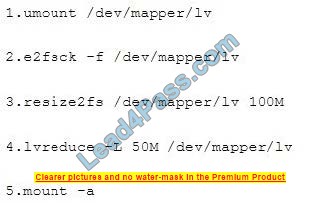RedHat EX294 RHCE Exam Solutions | Latest EX294 Dumps
leads4pass EX294 Dumps contains 75 latest exam questions and answers, covering more than 90% of RedHat EX294 “Red Hat Certified Engineer (RHCE) exam for Red Hat Enterprise Linux 8” actual exam questions! For your best Exam Solutions.
leads4pass EX294 exam questions and answers are updated throughout the year! Guaranteed to be available anytime! Download EX294 Dumps: https://www.leads4pass.com/ex294.html
One-time use 365 days free update! You can also choose the learning method that suits you according to your learning habits: PDF and VCE learning formats are provided to help you learn easily and pass RedHat EX294 RHCE Exam successfully.
Here you can always get more: leads4pass EX294 dumps page provides download free Demo for you to experience, you can also participate in the following online practice tests
Latest RedHat EX294 dumps Exam Questions:
| From | Number of exam questions | Exam name | Exam code |
| leads4pass | 15 | Red Hat Certified Engineer (RHCE) exam for Red Hat Enterprise Linux 8 | EX294 |
Question 1:
Create a playbook called timesvnc.yml in /home/sandy/ansible using the system role time sync. Set the time to use the currently configured nip with the server 0.uk.pool.ntp.org. Enable burst. Do this on all hosts.
A. Answer: See the complete Solution below.
Correct Answer: A
Solution as:

Question 2:
Create a playbook called webdev.yml in \’home/sandy/ansible. The playbook will create a directory Avcbdev on the dev host. The permission of the directory is 2755 and the owner is webdev. Create a symbolic link from /Web dev to /var/www/html/web dev. Serve a file from Avebdev7index.html which displays the text “Development” Curl http://node1.example.com/webdev/index.html to test
A. Answer: See the complete Solution below.
Correct Answer: A
Solution as:

Question 3:
Prevent Mary from performing user configuration tasks in your system.
A. Answer: See the complete Solution below.
Correct Answer: A

Conclusions:
1. I find that it is common to add various service access limits in the exam RHCE. The exercises like:
require one network segment can be accessed another network segment can not be accessed, the following are some conclusions for various services:
tcp_wrappers:/etc/hosts.allow,/etc/hosts.deny
tcp_wrappers can filter the TCP\’s accessing service. TCP has the filtering function which depends on this service whether uses the function library of tcp_wrappers, or this service whether has the xinetd process of starting the function of
tcp_wrappers. tcp_wrappers\’s main configuration file is /etc/hosts.allow,/etc/ hosts.deny.
And the priority of the documents in hosts. allow is higher than hosts. deny. The visit will be passed if no match was found.
sshd,vsftpd can use the filtering service of tcp_wrappers.
Configuration example:

Notice:
The two configuration files\’ syntax can refer to hosts_access (5) and hosts_options(5) sshd_config There are four parameters in this configuration file: DenyUsers, AllowUsers, DenyGroups, AllowGroups, they are used to limit some users or
user groups to proceed with Remote Login through SSH. These parameters\’ priority level is DenyUsers->AllowUsers->DenyGroups->AllowGroups Configuration example:

httpd Service Through the /etc/httpd/conf/httpd.conf in parameters, can add to control the url access. Just as:

Notice:
So pay attention, deny\’s and allow\’s priority level in order deny, allow is: the backer has the higher priority level. But here, allow\’s priority has a higher priority level.
NFS Service
NFS service directly controls the visits through file /etc/exports, just as:

samba Service
Parameter hosts allow in /etc/samba/smb.conf which is used as Access Control, just as:

2.
Paying attention to using Mount parameters: _netdev, defaults when you are mounting ISCSI disk.
3.
Stop the NetworkManager /etc/init.d/NetworkManager stop chkconfig NetworkManager off
4.
When you are deploying ifcfg-ethX, add parameters: PEERDNS=no
5.
Empty the firewall in RHCSARHCE:
6.
Narrow lv steps:
7.
Mount the using command – swap which is newly added in /etc/fstab
8.
If Verification is not passed when you are installing software, can import the public key: rpm import /etc/PKI/ rpm…/…release and so on. In yum. repo, you also can deploy gpgkey, for example, gpgkey=/etc/PKI/rpm…/ …release
9.
When you are using the “Find” command to search and keep these files, pay attention to using cp -a to copy files if you use user name and authority as your searching methods.


Question 4:
SIMULATION
You are giving RHCE exam. The examiner gave you the Boot related problem and told to you that make successfully boot the System. When you started the system, System automatically asking the root password for maintenance. How will you fix that problem?
A.
Correct Answer: Please see the explanation
Question 5:
Create a playbook called issue.yml in /home/sandy/ansible which changes the file /etc/issue on all managed nodes: If the host is a member of (lev then write “Development” If the host is a member of the test then write “Test” If the host is a member of prod then write “Production”
A. Answer: See the complete Solution below.
Correct Answer: A
Solution as:

Question 6:
SIMULATION
Given the kernel of permanent kernel parameters: sysctl=1. It can be shown on the cmd line after restarting the system. Kernel of /boot/grub/grub.conf should be a34dded finally, as:
A.
Correct Answer: Please see the explanation
Question 7:
Make an on /storage directory that only the user owner and group owner member can fully access.
A. Answer: See the complete Solution below.
Correct Answer: A
1.
chmod 770 /storage
2.
Verify using: ls -ld /storage
Note:
The preview should be like this: drwxrwx— 2 root sys users 4096 Mar 16 18:08 /storage To change the permission on the directory we use the chmod command. According to the question, only the owner user (root) and group member (sys users) can
fully access the directory so:
chmod 770 /archive
Question 8:

SIMULATION
Please open the ip_forward and take effect permanently.
A.
Correct Answer: Please see the explanation
Question 9:
SIMULATION
There are Mail servers, Web Servers, DNS Servers, and Log Server. Log Server is already configured. You should configure the mail server, web server, and DNS server to send the logs to the log server.
A.
Correct Answer: Please see the explanation
Question 10:
There were two systems:
system1, the main system on which most of the configuration takes place system2, some configuration here
Configure repository.
Create a Repository for your virtual machines. The URL is http://station.network.0.example.com/content/ rhel7.0/x86_64/dvd
A. Answer: See the complete Solution below.
Correct Answer: A

Save and Exit (:wq) Then run this:

Question 11:
Create user accounts
–> A list of users to be created can be found in the file called user_list.yml
which you should download from http://classroom.example.com/user_list.yml and save to /home/admin/ansible/
–> Using the password vault created elsewhere in this exam, create a playbook called
create_user.yml
that creates user accounts as follows:
–> Users with a job description of a developer should be:
–> created on managed nodes in the “dev” and “test” host groups assigned the
password from the “dev_pass”
variable and this user should be a member of the supplementary group “DevOps”.
–> Users with a job description of manager should be:
–> created on managed nodes in the “prod” host group assigned the password from
the “mgr_pass” variable
and this user should be a member of the supplementary group “ops mgr”
–> Passwords should use the “SHA512” hash format. Your playbook should work using
the vault password file
created elsewhere in this exam.
while practicing you to create these files here. But in the exam have to download it as per the question.
user_list.yml file consists:
user:
–
name: user1
job: developer
–
name: user2
job: manager
A. Answer: See the complete Solution below.
Correct Answer: A
Solution as:
# pwd /home/admin/ansible # wget http://classroom.example.com/user_list.yml # cat user_list.yml # vim create_user.yml
-name:
hosts: all
vars_files:
-./user_list.yml
-./vault.yml
tasks:
-name: creating groups
group:
name: “{{ item }}”
state: present loop:
-DevOps
– ops mgr
–
name: creating user:
name: “{{ item.name }}”
state: present
groups: DevOps
password: “{{ dev_pass|password_hash (\’sha512\’) }}” loop: “{{ user }}”
when: (inventory_hostname in groups[\’dev\’] or inventory_hostname in groups[\’test\’]) and item.job == “developer”
–
name: creating user:
name: “{{ item.name }}”
state: present
groups: ops mgr
password: “{{ mgr_pass|password_hash (\’sha512\’) }}” loop: “{{ user }}”
when: inventory_hostname in groups[\’prod\’] and item.job == “manager” wq!
# ansible-playbook create_user.yml -–vault-password-file=password.txt -–syntax-check
# ansible-playbook create_user.yml -–vault-password-file=password.txt
Question 12:
Install the RHEL system roles package and create a playbook called timesync.yml that: –> Runs overall managed hosts.
–> Uses the time sync role.
–> Configures the role to use the time server 192.168.10.254 ( Hear in redhat lab
use “classroom.example.com” )
–> Configures the role to set the burst parameter as enabled.
A. Answer: See the complete Solution below.
Correct Answer: A
Solution as:
# pwd
home/admin/ansible/
# sudo yum install the-system-roles.noarch -y
# cd roles/
# ansible-galaxy list
# cp -r /usr/share/ansible/roles/the system-roles. time sync.
# vim timesync.yml
-name: time synchronization hosts: all vars: timesync_ntp_provider: chrony timesync_ntp_servers:
-hostname: classroom.example.com _ in exam its ip-address burst: yes timezone: Asia/Kolkata roles:
-the-system-roles.time sync
tasks:
-name: set timezone
timezone:
name: “{{ timezone }}”
wq!
timedatectl list-timezones | grep India
# ansible-playbook timesync.yml –syntax-check
# ansible-playbook timesync.yml
# ansible all -m shell -a \’chronic sources -v\’
# ansible all -m shell -a \’timedatectl\’
# ansible all -m shell -a \’systemctl is-enabled chronyd\’
Question 13:
There were two systems:
system1, the main system on which most of the configuration takes place system2, some configuration here Configure port forwarding.
Configure server X to forward traffic incoming on port 80/TCP from source network 172.25.X.0/255.255.255.0 to port 5243/TCP.
A. Answer: See the complete Solution below.
Correct Answer: A

Question 14:
Configure the kernel parameters: rhelblq=1, and it is requested that your kernel parameters can be verified through /proc/cmdline.
A. Answer: See the complete Solution below.
Correct Answer: A

Question 15:
Add a cron schedule to take a full backup of /home on every day at 5:30 pm to /dev/st0 device.
A. Answer: See the complete Solution below.
Correct Answer: A
1.
vi /var/schedule 30 17 * * * /bin/dump -0u /dev/st0 /dev/hda7
2.
crontab /var/schedule
3.
service cron restart
We can add the cron schedule either by specifying the script’s path on the/etc/crontab file or by creating a text file on the crontab pattern.
cron helps to schedule recurring events. The pattern of cron is: Minute Hour Day of Month Month Day of Week Commands
0-59 0-23 1-31 1-12 0-7 where 0 and 7 mean Sunday.
Note * means every. To execute the command every two minutes */2.
…
leads4pass EX294 Dumps contains 75 latest exam questions and answers, one-time use enjoys free updates for 365 days! It also provides PDF and VCE multiple learning formats to assist you in easily learning and passing the RedHat EX294 RHCE Exam!
Use RedHat EX294 RHCE Exam Solutions: Download EX294 dumps with PDF and VCE: https://www.leads4pass.com/ex294.html, to help you pass the exam 100% successfully.